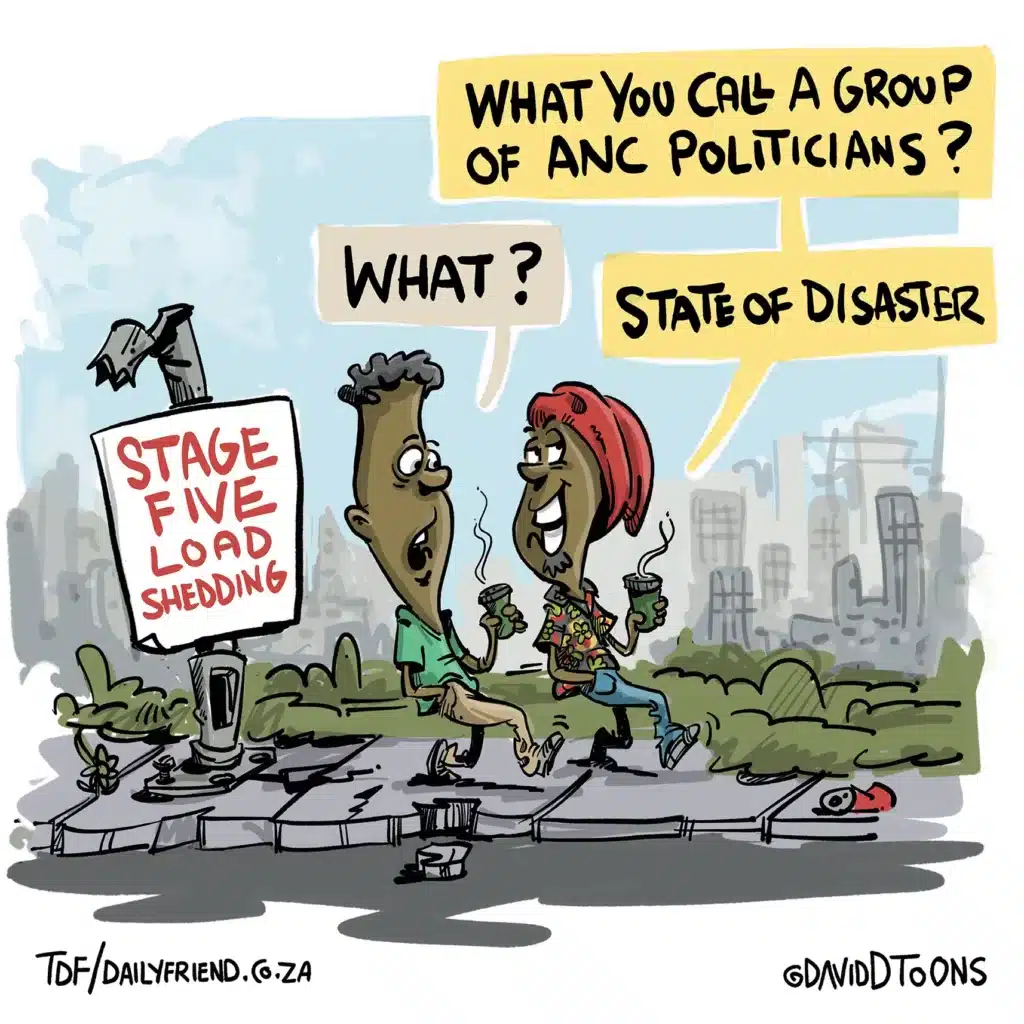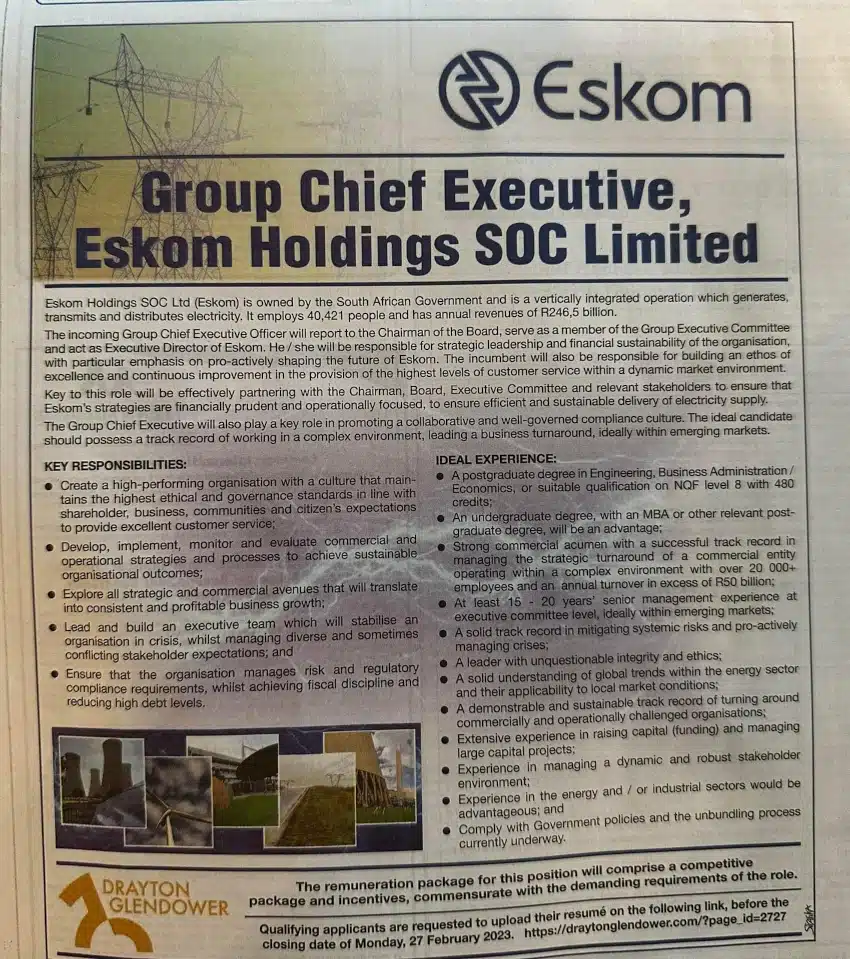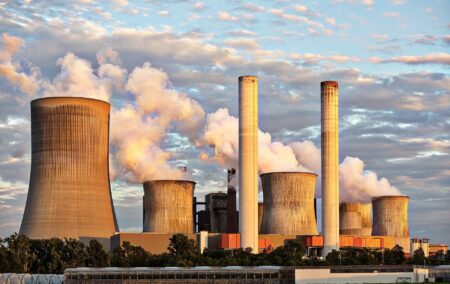A state of disaster declaration would double down on the policies, ideology and command-style economy that brought South Africa to a state of disaster in the first place.
‘What do you call a group of ANC politicians?’
‘A state of disaster.’
David Doubell, The Daily Friend’s excellent cartoonist, hit the nail on the head.

Even the most ardent lefties have been forced to concede that ANC rule is a disaster, and the ANC is to blame.
Nick Hedley, at News24 (paywalled), catalogued the parlous state of the country’s electricity, railway and water infrastructure – 11% decline in electricity generation in 15 years; 26% decline in rail freight in a decade; 97% decline in rail passengers in 10 years despite a 13% increase in staff.
Hedley concludes that ‘first prize is to vote in a new government’.
He adds: ‘The governing party is clearly incapable of fixing the mess it’s created, and ministers including Gwede Mantashe constantly stand in the way of solutions.’
The Marxist, Franz Fanon-quoting Andile Zulu is from the Alternative Information and Development Centre NGO (which is like ‘alternative facts’ but for socialists). Some time ago, he called the ANC a ‘post-colonial disappointment’ in the Mail & Guardian. Being a socialist, his proposed solution is more revolution and less neoliberalism, of course, but he does not doubt that ANC policy has failed the people.
Prof. Jonathan Jansen put himself in the firing line of the social media outrage machine by asking, in the Sunday Times (paywalled) whether people are really better off now than they were under apartheid.
(This requires a nuanced answer, since ‘better off’ is a vague term. In some obvious ways, things are worse, but in many ways, they are not. Despite the country’s disintegrating infrastructure, many millions of people have better access to electricity, water, healthcare and a social safety net than they did under apartheid. And we cannot ignore the immeasurable value of freedom from racial oppression and equality before the law, even if new racist policies continue to exist.)
Petty tyranny
Now, we are told that the ANC wants to declare a formal state of disaster in order to remedy the actual state of disaster it has created.
What’s worse, they want the petty tyrant Nkosazana Dlamini-Zuma, who so cavalierly wielded the absolute power to violate people’s rights during the pandemic, to lead the government’s efforts under this disaster declaration.
It is, of course, absurd to declare a national disaster over a disaster of the government’s own making. In a constitutional democracy, the proper resolution to such a disaster is not to grant the government totalitarian powers and remove oversight rules designed to curb corruption, but to remove the government altogether and vote in a new one.
A week ago, president Cyril Ramaphosa called for South Africa’s enormous challenges to be addressed with urgency.
Upon whom is he calling? He is supposed to be in charge. He is the head of the state that is supposed to lead economic development, according to ANC dogma. If, despite the ANC’s almost complete control over all levers of power thanks to cadre deployment, Ramaphosa cannot make it happen, he needs to cede his position to someone who can, posthaste.
The ANC government has mismanaged almost all entities under its control. Municipalities are collapsing. Water infrastructure is failing. The electricity system is in crisis. Roads are crumbling. Government buildings are dilapidated and in disrepair. The SABC is bankrupt. Denel is broke. Transnet is completely derailed.
The ANC is a reverse Midas. Everything it touches goes to the dogs, and you’d be hard pressed to find anyone not beholden to the ANC (like big business) disputing that view.
Ideology and policy
The reasons for this are rooted in ideology and policy. The ANC has endeavoured to establish a ‘developmental state’ characterised by broad state intervention, detailed regulation and central planning. It sought to emulate the command economies of the ‘Asian tigers’, without the capacity to do so.
It could rely on few of its appointees, political or in the civil service, to be competent, experienced, and honest. That is also a consequence of policy: particularly, the policy of cadre deployment by which the ANC sought to establish control over the commanding heights of the economy.
The establishment of an extensive patronage network through preferential procurement secured the power of politicians by buying votes, but also threw the doors wide open, at all levels of government, for corruption.
Almost all government contracts, no matter how small, must include an ‘approved supplier’ as a middleman who skims money off the top for doing nothing whatsoever.
All private businesses of notable size must offer shareholding to an ‘empowerment partner’, who frequently does nothing other than provide political connections that help to direct tenders their way.
Socialist blueprint
The ANC’s relentless pursuit of the National Democratic Revolution, the socialist blueprint written for South Africa by the South African Communist Party in 1962 – which is the origin of so much of the outdated Soviet-style language used by senior government officials – has expanded the state and supported its unproductive cronies at the expense of independent private businesses, as well as hapless citizens reduced to expressing their dissatisfaction through routine ‘service delivery protests’.
The government is not turning away from any of these policies.
The ANC is proposing to fix the national state of disaster by declaring a national state of disaster that gives it more power to pursue the very policies and ideology that caused the disaster in the first place.
It will grant itself extensive legal powers to command the people and the economy without any real oversight at all.
A supine Parliament will surely not stand in its way, and the courts are also loath to usurp executive power by curbing the powers the government is entitled to assume under the Disaster Management Act.
It is an open invitation to even more corruption (remember how we were promised there would be no PPE corruption?). All it will achieve is to make South Africa go to the dogs a little faster.
Eskom CEO advert
The advertisement for a new CEO for Eskom – which took almost two full months to produce since André de Ruyter’s resignation was announced – is a good illustration of why a state of disaster won’t work.

‘The incoming Group Chief Executive Officer will report to the Chairman of the Board,’ it says. That violates all corporate governance codes, which insist that the chairperson of the board should not interfere with the CEO’s executive duties and should themselves be non-executive.
If the CEO ‘reports to’ the chairperson, then the chairperson becomes an executive chairperson, and the CEO is, well, not a CEO, but a lackey.
The job ad also says the new CEO will be required to ‘comply with government policies’.
So, they want a pliant toady for the job, who does what they are told.
Meanwhile, Gwede Mantashe is going around saying things like ‘I don’t build power stations’, and ‘Eskom must sort out its own security’.
He is washing his hands of the failure of his department to procure sufficient new generation capacity, and abdicating the government’s responsibility to act against the crime syndicates that are largely in control of Eskom, from coal deliveries to plant maintenance.
Anyone who meets the government’s criteria for the Eskom CEO position walks into the job with their hands tied behind their back, without the power to stand up to government’s corrosive policies. They also now know that standing up against corruption is a good way to get assassinated.
Why would anyone expect that things will improve under a state of disaster? Led by Dlamini-Zuma, to boot?
The ANC caused this state of disaster. Its resolution can only begin when the party is ousted from government.
The views of the writer are not necessarily the views of the Daily Friend or the IRR.
If you like what you have just read, support the Daily Friend.
Image by Benita Welter from Pixabay

